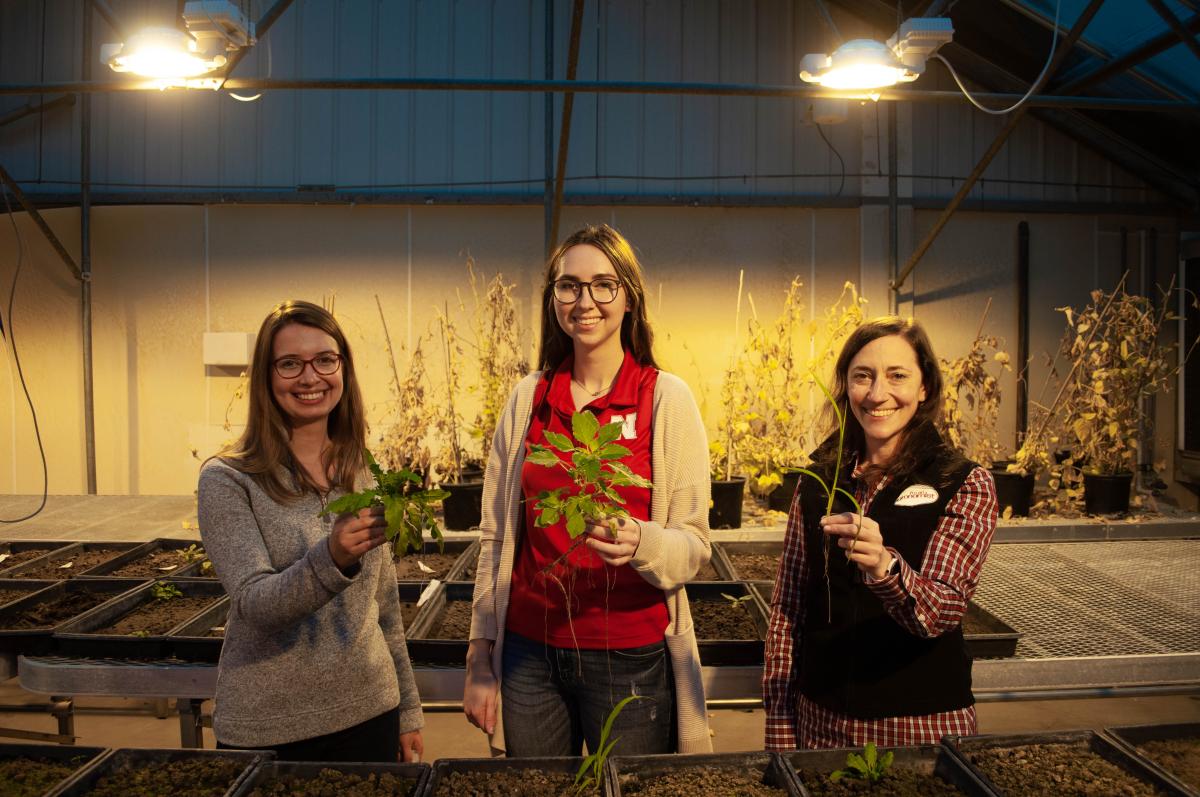
Digging Into Nebraska’s Soil Health
Soil Health Initiative Impact on Nebraska
Soil is a cornerstone of crop production, water management, and erosion control, as well as human, land, and wildlife health.
Soil is also the medium that supports life and provides fuel, fiber, and food for all living organisms. Therefore, when stressors impact soil, they also impact other ecological systems.
The Soil Health Initiative is a collaborative project between university researchers and Extension specialists, Nebraska farmers and ranchers, and the Natural Resource Conservation Service (NRCS) that encourages the adoption of soil health and rangeland management systems through the Nebraska On-Farm Research Network.
Soil health is defined as the ability of soil to sustain stressors from plants, animals, and humans. Healthy soil provides clean air and water, sustained crops, and productive land.
Andrea Basche, assistant professor in the Department of Agronomy and Horticulture and Laura Thompson, associate Nebraska Extension educator with the Nebraska On-Farm Research Network at the University of Nebraska–Lincoln, examine ways to preserve and improve soil health.
“We work with farmers and experiment with different cover crop treatments on their farms,” Basche said. “It is a great opportunity for us to explore research questions, co-develop with farmers, and compare results in smaller field experiments with working farms.”
Healthy soils allow for reliable and sustainable food sources, even in times where extreme weather events such as flooding and drought cause food instability.
“We examine how different production practices can impact the soil's ability to produce quality food, feed, fiber, fuel and the cropping systems resilience to different environmental impacts,” Thompson said.
Funded by the USDA-NRCS, the Soil Health Initiative determines best practices for landowners, producers, and communities, such as integrating livestock, rotating crops, using cover crops, and minimizing soil disturbances.
Working Together with Farmers
As part of the Soil Health Initiative, the Nebraska On-Farm Research Network provides Nebraska farmers and ranchers with the opportunity to their operations by participating in their studies.
“The mission of the On-Farm Research Network is to enable farmers to gain answers to critical production, profitability, and sustainability questions using their own fields and equipment,” Thompson said. “Farmers are curious to learn, and we enjoy working with curious people.”
Through the On-Farm Research Network, farmers work with researchers to determine a topic. While many farmers tend to choose aspects of cover crop management, livestock integration and crop rotation are also options.
As one example, a farmer might look at how a cover crop impacts soil organic matter, water holding capacity, and crop yields compared to no cover crop.
As farmers and ranchers consider the future, they must consider the value of their land and the quality of their soil in the long term. This includes not only productivity, but also keeping the soil and the surrounding environment healthy.
The Soil Health Initiative and the Nebraska On-Farm Research Network collect data from research farms around the state, measuring the impact of different practices on soil health and cash crops.
Extreme Weather
Healthy soils help reduce production deficits caused by extreme weather events such as flooding or drought. Again, cover crops are an option to improve soil health between cash crops or periods of heavy grazing that may deplete nutrients within the soil.
“Maintaining healthy soils can allow us to reduce the risk of negative impacts from flooding, drought, and extreme weather conditions,” Thompson said.
Using cover crops has been shown to reduce environmental stressors on cash crops. One benefit is weed control, Basche said, and when there are fewer weeds, there is less competition for resources, ultimately benefiting the cash crop.
Soil Conservation is an Agricultural Staple
One way to keep soil healthy is through soil conservation. Soil conservation focuses on keeping soils healthy through a combination of techniques.
Elizabeth Oys and Fernanda Souza Krupek, graduate students in Department of Agronomy and Horticulture at the university, work with the Soil Health Initiative, particularly studying soil conservation.
Specifically, Krupek’s research found that more nitrogen could be available to cash crops following cover crops, representing potential fertilizer savings for farmers.
Oys’ research found that that cover crops suppressed pigweed seeds (a problematic weed in Nebraska that has developed resistance to several different herbicides) in the soil. This research is promising to demonstrate the role that cover crops can play in an integrated weed management strategy with concurrent soil benefits.
“The phrase ‘soil health’ is not new,” Oys said, “But it has become a prevalent topic in recent years as a unique and powerful solution to many of the 21st century stressors, such as the degradation of natural resources.”
Soil provides nutrients and natural resources such as heat and oxygen.
“Soil conservation ensures that nutrients and resources will continue to be available into the future,” Krupek said.
Preserving soil health can help preserve and protect natural resources and native plant and wildlife populations.
For more information about the Soil Health Initiative and the research being conducted, please visit https://cropwatch.unl.edu/soilhealth.
For more information about the Nebraska On-Farm Research Network, please visit https://on-farm-research.unl.edu/.
Key Takeaways:
- Soil is the medium that supports life and provides fuel, fiber, and food for all living organisms.
2. The Soil Health Initiative is a collaborative project between university researchers and Extension specialists, Nebraska farmers and ranchers, and the Natural Resource Conservation Service (NRCS) that encourages the adoption of soil health and rangeland management systems through the Nebraska On-Farm Research Network.
3. Soil health is defined as the ability of soil to sustain stressors from plants, animals, and humans. Healthy soil provides clean air and water, sustained crops, and productive land.
- For more information about the Soil Health Initiative, visit: http://cropwatch.unl.edu/soilhealth.
- For more information about the Nebraska On-Farm Research Network, visit: https://on-farm-research.unl.edu/.
